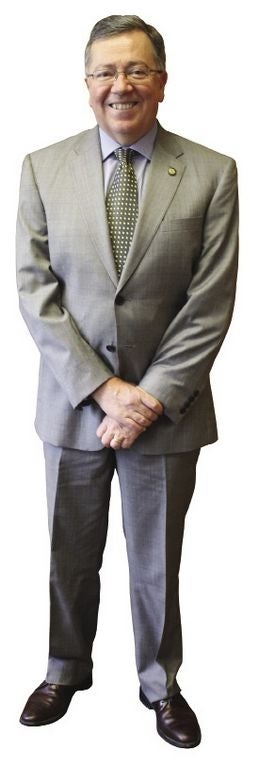F. Javier Cevallos, a native of Ecuador who holds a doctoral degree from the University of Illinois, began his career in higher education as a professor of Spanish in 1984. He entered the administrative side when he became vice chancellor for student affairs at the University of Massachusetts at Amherst, a post he held until 2002. That was followed by a 12-year stint as president of Kutztown University in Kutztown, Pa, where he oversaw multimillion-dollar construction projects and established several international programs. Cevallos brought his talents to Framingham State in July 2014 and was inaugurated May 1. He recently discussed his goals, and the state of public universities, with MetroWest495 Biz.
What’s your most important goal for Framingham State University?
We want to continue to move the institution forward academically, the way that it is perceived in the region and nationally. We want to get a better understanding of how we can move up in national rankings and those kinds of things that are important just from a marketing point of view. So I think we have to do better marketing of the wonderful things that we do. This is an institution that has a long tradition, a great history and incredible quality; I mean, we attract faculty (who) are just unbelievable. So we just have to let people know how good it is.
How did the recession change the way people perceive public colleges and universities?
I think when there’s an economic downturn, people start to realize the cost of an education in the private sector is very high and we provide an excellent value for education.
When the economic downturn happened a lot of people started to realize (that) yes, you get more prestige when you go to an institution that charges $60,000 a year, or you can come here … I always joke around that calculus is calculus; it doesn’t matter whether you learned it, at a private institution or here. The content is the same.
There’s been a push among adjunct faculty at Boston-area private institutions to unionize, bringing them in line with adjuncts at state schools. Will adjunct unionization become standard in Massachusetts?
Some schools pay their adjuncts very well, so there’s no incentive to unionize. Some schools do not; therefore there’s more incentive. The Northeast in general is very union friendly, and Massachusetts is a very union-friendly state, so I think the unions do have a lot of strength here, so I wouldn’t be surprised to see more private institutions getting adjuncts … to unionize.
How does Massachusetts stack up in terms of state financial support of the public university system compared to other parts of the country?
Massachusetts is turning around and over the last few years has started to reinvest in higher education. Certainly in the ’90s and early 2000s, there was a tremendous decline in state support, so we’re still lagging behind … compared to states that are putting (forth a lot more resources).
If the trend continues the way it has in the last few years, we will be in good shape down the road. There’s a commitment (by the state) to reach 50/50 funding: 50 percent (paid by) the state, 50 percent from the student. That would be wonderful and that would be a great model for the state to have.
There’s a lot of emphasis on updating degree offerings to fit the needs of the workforce and working professionals. How is Framingham State trying to accomplish this?
We just (launched) two years ago a professional master of science degree … This one is in quality control for biotechnology. That is geared towards a specific sector. We are starting to think of (launching) a program to certify (that) our undergraduate students … are ready to work in certain fields. And we are developing science, technology, engineering and mathematics (programs). We are just completing a new building that should be complete next fall. We will add lab space that will allow us to increase our offerings in that area. Our business program continues to grow as well.
Do you still teach?
I haven’t done teaching in a while. It’s something I have in mind that I would like to do — maybe in a couple of years after I am settled down and established. I am in the foreign languages department, so I am a faculty member here … I was a professor for a long time and I enjoyed it a lot. For some reason I decided to explore administration and I discovered I enjoyed it even more because you can make a difference. You can decide to invest money in a new residence hall, a new science building … so I find it very satisfying.
This interview was edited for length and clarity by Emily Micucci.

